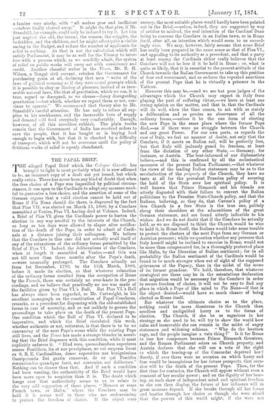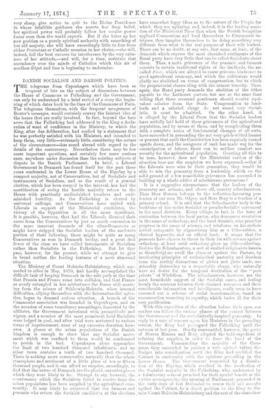THE PAPAL BRIEF.
THE alleged Papal Brief which the Cologne Gazette has brought to light is most probably what it is now affirmed to be, an incorrect copy of a draft not yet issued, but which really exists. There has never been any kind of doubt that when
the free choice of a Pope was imperilled by political circum- stances, it was open to the Cardinals to adopt any measure need- ful to guarantee a free choice, and the assertion of some of the German organs that a valid election cannot be held out of Rome if Pio Nono should die there, is disproved by the fact that Pius VII. was elected on March 13, 1800, by a Conclave assembled at Venice, Pius VI. having died at Valence. Indeed, a Brief of Pius VI. gives the Cardinals power to hasten the election in any way needful to the interests of the Church, so long as ten days were allowed to elapse after notifica- tion of the death of the Pope, in order to admit of Cardi- nals at a distance joining their colleagues. We believe that the Conclave in this case did not actually avail itself of any of the relaxations of the ordinary forms permitted by the Brief of Pius VI. Indeed, the deliberations of the Conclave, when at length it assembled at Venice,—and this was not till more than three months after the Pope's death, —were unusually prolonged. The Conclave actually sat from 1st December, 1799, to the 13th March, 1800, before it made its election, so that whatever relaxation of the ordinary forms resulted from the occupation of Rome by the French, there was certainly no over-haste in the pro- ceedings, and we believe that practically no use was made of the facilities given by Pius VI.'s Bull. But Pius VI.'s Bull has always since been regarded, as Mr. Cartwright, in his excellent monograph on the constitution of Papal Conclaves, remarks, as a precedent for dispensing with the old-established forms in case of necessity, and as not unlikely to govern the proceedings to take place on the death of the present Pope. One condition which the Bull of Pius VI. declared to be imperative, and which the Brief circulated this week, whether authentic or not, reiterates, is that there is to be no canvassing of the next Pope's name while the existing Pope still lives, and the Times has made a strange blunder in assert- ing that the Brief dispenses with this condition, while it most explicitly enforces it. " Illud vero, quemadmodum superiores omnes Pontifices, ita et nos prwcipimus, ne cui unquam liceat ex S. R. E. Cardinalibus, donee superstites nos benignissima Omnipotentis Dei gratia conservat, de eo qui Pontifex renunciandus quandque foret, aut convenire, aut deliberare." Nothing can be clearer than that. And if such a condition had been wanting, the authenticity of the Brief would have been more open to suspicion than it is. The doubt which hangs over that authenticity seems to us to relate to the very odd suggestion of three places, "Monaco or some French town, or Malta," where the Conclave may be held if it seems well to those who are endeavouring to protect the freedom of choice. If the object were ;secrecy, the most suitable places would hardly have been pointed out in the Brief,—unless, indeed, they are suggested by way of artifice to mislead, the real intention of the Cardinal Dean being to convene the Conclave in an Italian town, or in Rome itself, after all, an intention which would seem to us exceed- ingly wise. We may, however, fairly assume that some Brief has really been prepared in the same sense as that of Pius VI., and appealing to its authority as a precedent, and that a party at least among the Cardinals either really believes that the Conclave will not be free if it be held in Rome ; or, what is quite as likely, that it is essential to the present attitude of the Church towards the Italian Government to take up this position of fear and resentment, and so endorse the repeated assertions of the present Pope that he is virtually a prisoner in the Vatican.
However this may be,—and we are but poor judges of the advantages which the Church may expect in Italy from playing the part of suffering virtue,—we have at least one strong opinion on the matter, and that is, that the Cardinals will do well, when the time comes, to act with as stately a deliberation and as precise an observance of all the ordinary forms,—unless it be the one form of electing the new Pope in the same place where the former Pope died,—as if there were no struggle between the Church and any great Power. For our own parts, as regards the case of Italy, we feel no manner of doubt, not only that the Conclave, if it meets on Italian soil, will be perfectly free, but that Italy will jealously guard its freedom, at least from the dictation of any other State, — Germany, for instance, or Austria. The best-informed of our diplomatists believe,—and this is confirmed by all the ecclesiastical measures of the present Italian Parliament,—that whatever the views of the leading Italian statesmen may be as to the secularisation of the property of the Church, they have no taste at all for the prevalent Prussian policy of securing the hold of the State over her spiritual policy. It is well known that Prince Bismarck and his friends are utterly disgusted with their failure to convert the Italian politicians to the Prussian State-Church policy, and that the Italians, believing, as they do, that Cavour's policy of a free Church in a free State is the true one, politely shrug their shoulders at the admonitions of the great German statesman, and are found utterly inflexible to his wishes. And we do not doubt that if the Conclave be actually held, as we are disposed to think the Church would be wise to hold it, in Rome itself, the Italians would take some trouble to protect the electors of the next Pope from any German or Austrian pressure; while we question whether any pressure that Italy herself might be inclined to exercise in Rome, would not be more than compensated for, in a thoroughly protected place like Malta, by the liberation of Italian sentiment ; for in all probability the Italian sentiment of the Cardinals would be found to be much stronger when out of sight of the supposed grievances of the Papacy, than in the midst of the scene of its former grandeur. We hold, therefore, that whatever strategical use there may be in the ostentatious declaration that migration would be necessary for the Conclave in order to secure freedom of choiee, it will not be easy to find any place in which a Pope of like mind to Pio Nono—if that is the object desired—would have so much chance of being elected as Rome itself.
But whatever the ultimate choice as to the place, nothing could be more disastrous to the Church than needless and undignified hurry as to the forms of election. The Church, if she be as sagacious in her strategy as she used to be, will try to show the world how calm and immovable she can remain in the midst of angry statesmen and widening schisms. "Why do the heathen rage, and the people imagine a vain thing ?" Is it for Rome to lose her composure because Prince Bismarck threatens, and the Roman Parliament seizes on Church property, and Austria declares that she will use a veto of the right to which the tearing-up of the Concordat deprived her ? Surely, if ever there were an occasion on which hurry and fear would be inauspicious for her future prospects, that occa- sion will be the death of the present Pope. Then, for the first time for centuries, the Church will appear without even a remnant of her secular power ; and on the dignity of her bear- ing, on such show of independent mind and spiritual freedom as she can then display, the future of her influence will in great measure depend. If she breaks through all her forms and bustles through her choice as though she were afraid that the powers of this world might, if she were not very sharp, give notice to quit to the Divine Providence in whose infallible guidance she asserts her deep belief, her spiritual power will probably follow her secular power faster even than the world expects. But if she takes up her new position as a purely spiritual authority with something of her old majesty, she will have exceedingly little to fear from either Protestant or Catholic aversion to her choice,—she will, indeed, foil the best excuses for interference by the very calm- ness of her attitude,—and will, for a time, maintain that ascendancy over the minds of Catholics which this air of needless fidget and fuss is beginning to undermine.



































 Previous page
Previous page